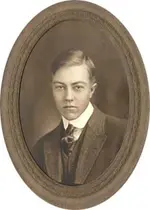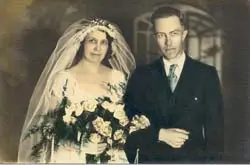Loraine Boettner (1901–1990) was a pivotal figure in Reformed theology, known for his lucid writing and unwavering commitment to the doctrines of grace. His work brought the intricate principles of Calvinism to a broader audience, helping many understand foundational truths about predestination, justification, and the authority of Scripture. Boettner's writings, particularly The Reformed Doctrine of Predestination, remain essential resources for anyone exploring Reformed theology and its implications for Christian living.
A Life Shaped by Faith and Study

Born on March 7, 1901, in the rural town of Linden, Missouri, Loraine Boettner grew up on a farm surrounded by the simplicity of country life. He began his education in small rural schools before attending Tarkio High School. Boettner initially pursued agriculture at the University of Missouri, but his sense of a higher calling led him to Tarkio College, where he graduated cum laude with a Bachelor of Science degree in 1925. During his time at Tarkio, Boettner’s worldview was profoundly shaped by Dr. J.B. Work, whose mentorship sparked Boettner’s embrace of postmillennialism and a deeper commitment to theological study.
In 1925, Boettner enrolled at Princeton Theological Seminary, an institution renowned for its strong Reformed tradition. He studied under Dr. C.W. Hodge, a leading theologian, and completed both his Th.B. and Th.M. degrees by 1929. His Th.M. thesis laid the groundwork for his first major book, The Reformed Doctrine of Predestination, which would later cement his reputation as a leading Reformed thinker.


His theological perspective further developed at Princeton Theological Seminary, where he became a member of the Warfield Club, a dining and discussion group named after the esteemed theologian B.B. Warfield, whom Boettner deeply admired. In The Millenium, Boettner would write that Warfield "...is to be ranked with Augustine, Calvin, and Charles Hodge as one of the four outstanding theologians in entire history of the Church.1"

Boettner’s professional career began at Pikeville College in Kentucky, where he served as a Bible professor from 1929 to 1937. During these years, he married Lillian Henry in 1932, and his early books were published, including The Reformed Doctrine of Predestination (1932), A Summary of the Gospels (1933), and The Inspiration of the Scriptures (1937). In 1937, Boettner transitioned to government work in Washington, D.C., where he was employed by the Library of Congress and the Bureau of Internal Revenue during the pivotal years of World War II.
After the war, Boettner relocated to Los Angeles in 1948 to care for his ailing wife, Lillian, who passed away in 1958. Following her death, Boettner returned to his hometown of Rock Port, Missouri, where he devoted his remaining years to writing and ministry. Tarkio College recognized his contributions with honorary Doctor of Divinity and Doctor of Literature degrees in 1933 and 1957, respectively.
Key Works of a Reformed Theologian
Loraine Boettner’s literary output remains a cornerstone of Reformed theological study. His most influential work, The Reformed Doctrine of Predestination (1932), provides a clear and compelling defense of Calvinistic soteriology, emphasizing God’s sovereignty in salvation. This book has been instrumental in introducing countless readers to the doctrines of grace.
Another significant work, Roman Catholicism (1962), offers a critical evaluation of Roman Catholic theology from a Reformed perspective, sparking considerable debate and dialogue. Other notable writings include Studies in Theology, The Millennium (an in-depth argumentation for Postmillenialism), and Immortality, which reflect Boettner’s wide-ranging interests and deep theological insights.
A Lasting Legacy
Loraine Boettner’s impact on Reformed theology extends far beyond his own lifetime. His ability to present complex theological ideas in accessible language has inspired generations of pastors, scholars, and laypeople. Theologians such as Joni Eareckson Tada and John Piper have drawn from Boettner’s works, acknowledging his role in revitalizing interest in Reformed doctrines during the 20th century. He continues to be cited in publications such as The Gospel Coalition and many of his works are still available in print.
Even decades after his death in 1990, Boettner’s writings continue to serve as a touchstone for those seeking to understand the biblical principles that underpin Reformed theology. His unwavering dedication to the truth and his ability to articulate it with clarity ensure that his influence will endure for many years to come.
While Boettner may be remembered primarily for his written works, his true legacy rests in the lives he touched during his work in ministry as he sought to live by the Word of God and "study to be quiet, and to do your own business, and to work with your hands, even as we charged you; that ye may walk becomingly toward them that are without, and may have need of nothing" (1 Thessalonians 4:11-12 ASV).
After the death of his wife in 1958, Boettner lived a humble life in Rock Port, Missouri, serving as a member in the Orthodox Presbyterian Church of the USA until his death in 19902. For Boettner, Christian theology was not just an abstract idea to be studied and pondered - it was the guide to how he lived his own life, and set an example for others to follow Christ in the United States during the twentieth century.

References
- Boettner, Loraine. The Millennium. Chapter II, page 11. Philadelphia: The Presbyterian and Reformed Publishing Co., 1957.
- Find A Grave. "Loraine Boettner (1901–1990)." Accessed December 16, 2024. https://www.findagrave.com/memorial/67030615/loraine-boettner.